Workplace Law Case: Analyzing Annie's Contract & Legal Issues
VerifiedAdded on 2023/06/07
|8
|1847
|372
Case Study
AI Summary
This case study analyzes the employment situation of Annie, a Vietnamese migrant, who initially worked as a full-time waitress at Chinatown Restaurant before resigning and subsequently being asked to contract her services through Restaurant Services Pty Ltd. The analysis focuses on whether Annie is a party to a valid employment contract, if she is still considered an employee of Chinatown, and whether Johanna, the HR manager, breached any Federal Legislation. The study applies the Fair Work Act 2009 and relevant case laws to determine the validity of Annie's contract, her status as an employee, and whether Johanna acted unlawfully in directing Annie to contract her services. The conclusion indicates that a valid contract exists, Annie is considered an employee, and Johanna breached the Fair Work Act.
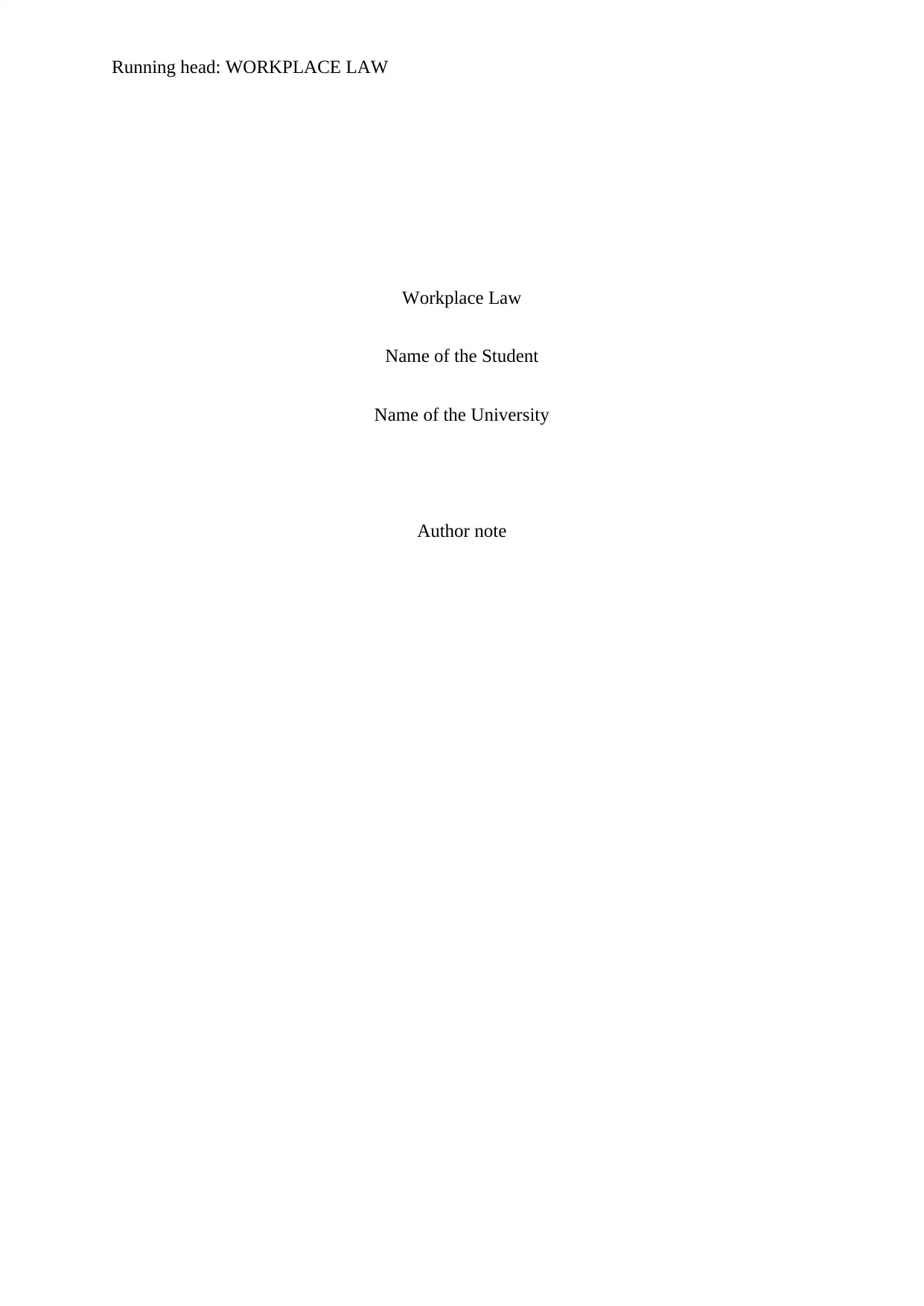
Running head: WORKPLACE LAW
Workplace Law
Name of the Student
Name of the University
Author note
Workplace Law
Name of the Student
Name of the University
Author note
Paraphrase This Document
Need a fresh take? Get an instant paraphrase of this document with our AI Paraphraser
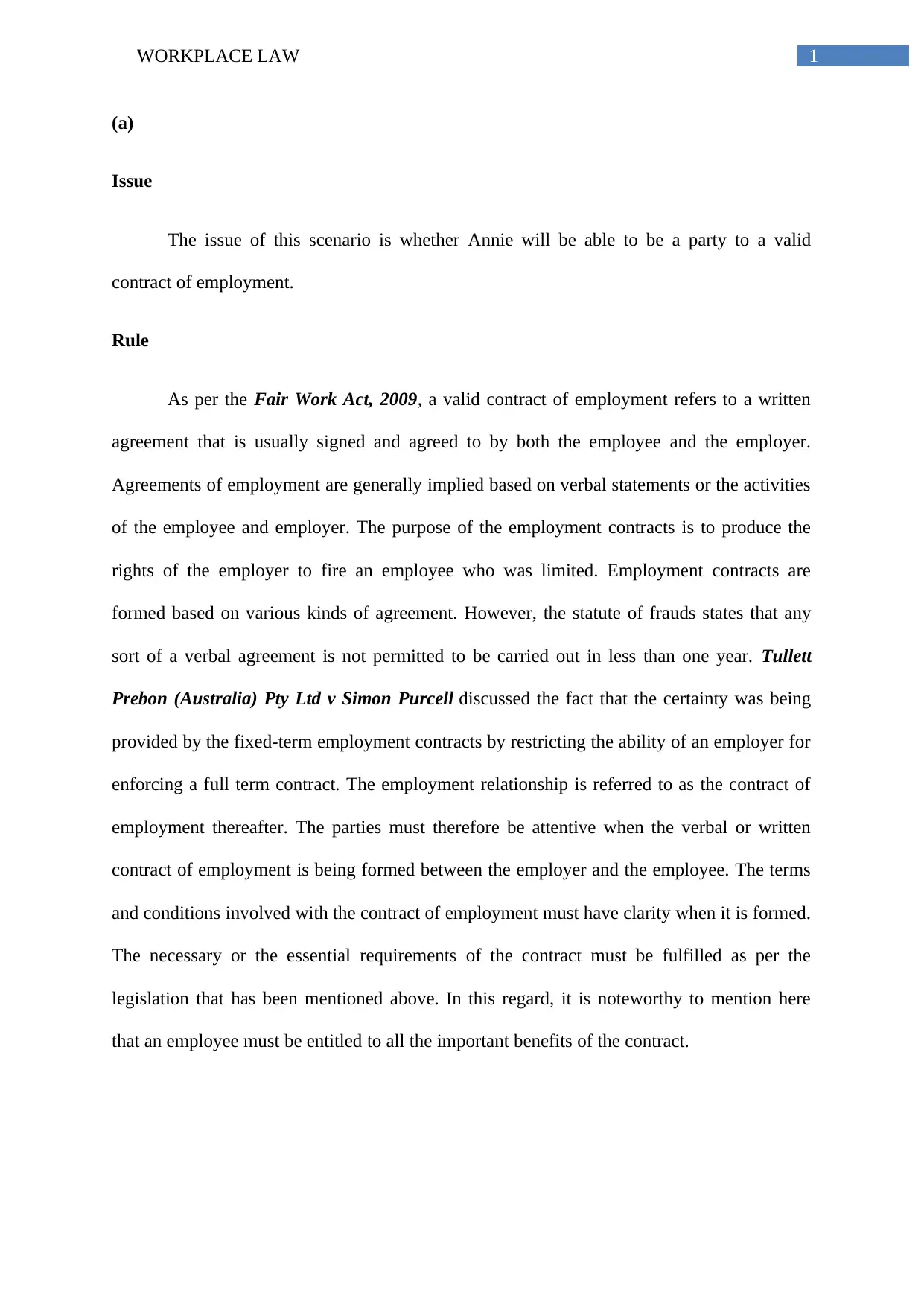
1WORKPLACE LAW
(a)
Issue
The issue of this scenario is whether Annie will be able to be a party to a valid
contract of employment.
Rule
As per the Fair Work Act, 2009, a valid contract of employment refers to a written
agreement that is usually signed and agreed to by both the employee and the employer.
Agreements of employment are generally implied based on verbal statements or the activities
of the employee and employer. The purpose of the employment contracts is to produce the
rights of the employer to fire an employee who was limited. Employment contracts are
formed based on various kinds of agreement. However, the statute of frauds states that any
sort of a verbal agreement is not permitted to be carried out in less than one year. Tullett
Prebon (Australia) Pty Ltd v Simon Purcell discussed the fact that the certainty was being
provided by the fixed-term employment contracts by restricting the ability of an employer for
enforcing a full term contract. The employment relationship is referred to as the contract of
employment thereafter. The parties must therefore be attentive when the verbal or written
contract of employment is being formed between the employer and the employee. The terms
and conditions involved with the contract of employment must have clarity when it is formed.
The necessary or the essential requirements of the contract must be fulfilled as per the
legislation that has been mentioned above. In this regard, it is noteworthy to mention here
that an employee must be entitled to all the important benefits of the contract.
(a)
Issue
The issue of this scenario is whether Annie will be able to be a party to a valid
contract of employment.
Rule
As per the Fair Work Act, 2009, a valid contract of employment refers to a written
agreement that is usually signed and agreed to by both the employee and the employer.
Agreements of employment are generally implied based on verbal statements or the activities
of the employee and employer. The purpose of the employment contracts is to produce the
rights of the employer to fire an employee who was limited. Employment contracts are
formed based on various kinds of agreement. However, the statute of frauds states that any
sort of a verbal agreement is not permitted to be carried out in less than one year. Tullett
Prebon (Australia) Pty Ltd v Simon Purcell discussed the fact that the certainty was being
provided by the fixed-term employment contracts by restricting the ability of an employer for
enforcing a full term contract. The employment relationship is referred to as the contract of
employment thereafter. The parties must therefore be attentive when the verbal or written
contract of employment is being formed between the employer and the employee. The terms
and conditions involved with the contract of employment must have clarity when it is formed.
The necessary or the essential requirements of the contract must be fulfilled as per the
legislation that has been mentioned above. In this regard, it is noteworthy to mention here
that an employee must be entitled to all the important benefits of the contract.
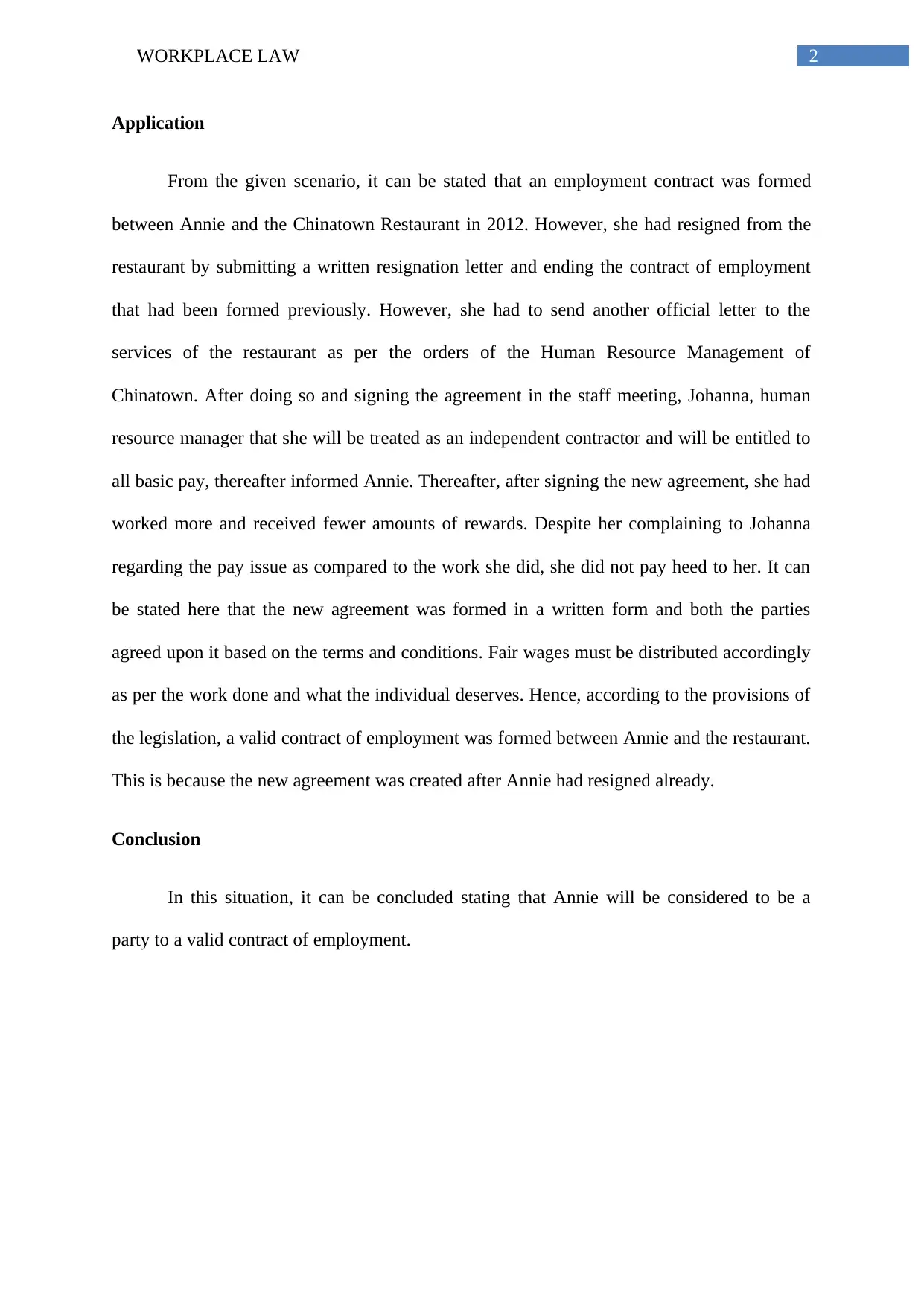
2WORKPLACE LAW
Application
From the given scenario, it can be stated that an employment contract was formed
between Annie and the Chinatown Restaurant in 2012. However, she had resigned from the
restaurant by submitting a written resignation letter and ending the contract of employment
that had been formed previously. However, she had to send another official letter to the
services of the restaurant as per the orders of the Human Resource Management of
Chinatown. After doing so and signing the agreement in the staff meeting, Johanna, human
resource manager that she will be treated as an independent contractor and will be entitled to
all basic pay, thereafter informed Annie. Thereafter, after signing the new agreement, she had
worked more and received fewer amounts of rewards. Despite her complaining to Johanna
regarding the pay issue as compared to the work she did, she did not pay heed to her. It can
be stated here that the new agreement was formed in a written form and both the parties
agreed upon it based on the terms and conditions. Fair wages must be distributed accordingly
as per the work done and what the individual deserves. Hence, according to the provisions of
the legislation, a valid contract of employment was formed between Annie and the restaurant.
This is because the new agreement was created after Annie had resigned already.
Conclusion
In this situation, it can be concluded stating that Annie will be considered to be a
party to a valid contract of employment.
Application
From the given scenario, it can be stated that an employment contract was formed
between Annie and the Chinatown Restaurant in 2012. However, she had resigned from the
restaurant by submitting a written resignation letter and ending the contract of employment
that had been formed previously. However, she had to send another official letter to the
services of the restaurant as per the orders of the Human Resource Management of
Chinatown. After doing so and signing the agreement in the staff meeting, Johanna, human
resource manager that she will be treated as an independent contractor and will be entitled to
all basic pay, thereafter informed Annie. Thereafter, after signing the new agreement, she had
worked more and received fewer amounts of rewards. Despite her complaining to Johanna
regarding the pay issue as compared to the work she did, she did not pay heed to her. It can
be stated here that the new agreement was formed in a written form and both the parties
agreed upon it based on the terms and conditions. Fair wages must be distributed accordingly
as per the work done and what the individual deserves. Hence, according to the provisions of
the legislation, a valid contract of employment was formed between Annie and the restaurant.
This is because the new agreement was created after Annie had resigned already.
Conclusion
In this situation, it can be concluded stating that Annie will be considered to be a
party to a valid contract of employment.
⊘ This is a preview!⊘
Do you want full access?
Subscribe today to unlock all pages.

Trusted by 1+ million students worldwide
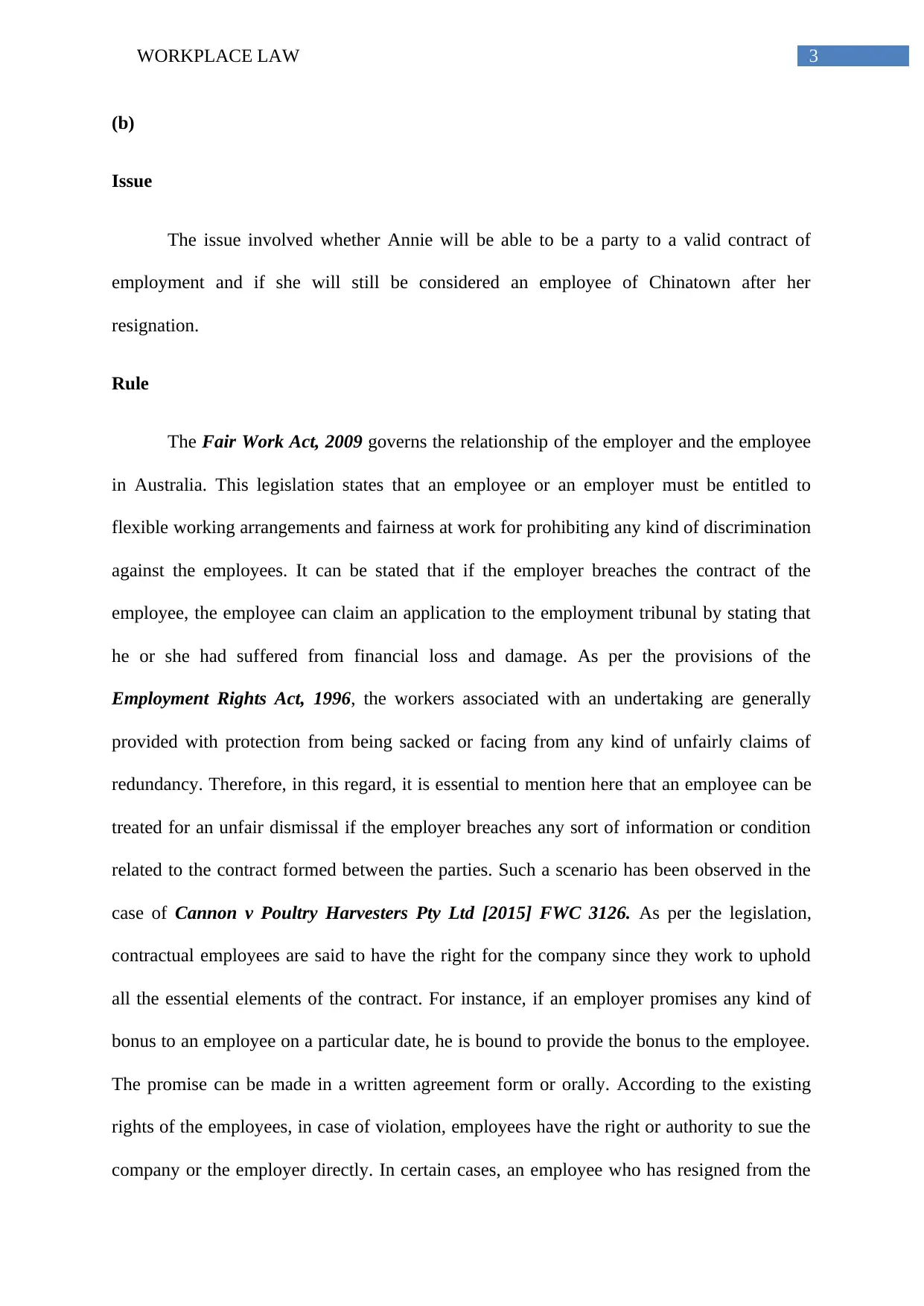
3WORKPLACE LAW
(b)
Issue
The issue involved whether Annie will be able to be a party to a valid contract of
employment and if she will still be considered an employee of Chinatown after her
resignation.
Rule
The Fair Work Act, 2009 governs the relationship of the employer and the employee
in Australia. This legislation states that an employee or an employer must be entitled to
flexible working arrangements and fairness at work for prohibiting any kind of discrimination
against the employees. It can be stated that if the employer breaches the contract of the
employee, the employee can claim an application to the employment tribunal by stating that
he or she had suffered from financial loss and damage. As per the provisions of the
Employment Rights Act, 1996, the workers associated with an undertaking are generally
provided with protection from being sacked or facing from any kind of unfairly claims of
redundancy. Therefore, in this regard, it is essential to mention here that an employee can be
treated for an unfair dismissal if the employer breaches any sort of information or condition
related to the contract formed between the parties. Such a scenario has been observed in the
case of Cannon v Poultry Harvesters Pty Ltd [2015] FWC 3126. As per the legislation,
contractual employees are said to have the right for the company since they work to uphold
all the essential elements of the contract. For instance, if an employer promises any kind of
bonus to an employee on a particular date, he is bound to provide the bonus to the employee.
The promise can be made in a written agreement form or orally. According to the existing
rights of the employees, in case of violation, employees have the right or authority to sue the
company or the employer directly. In certain cases, an employee who has resigned from the
(b)
Issue
The issue involved whether Annie will be able to be a party to a valid contract of
employment and if she will still be considered an employee of Chinatown after her
resignation.
Rule
The Fair Work Act, 2009 governs the relationship of the employer and the employee
in Australia. This legislation states that an employee or an employer must be entitled to
flexible working arrangements and fairness at work for prohibiting any kind of discrimination
against the employees. It can be stated that if the employer breaches the contract of the
employee, the employee can claim an application to the employment tribunal by stating that
he or she had suffered from financial loss and damage. As per the provisions of the
Employment Rights Act, 1996, the workers associated with an undertaking are generally
provided with protection from being sacked or facing from any kind of unfairly claims of
redundancy. Therefore, in this regard, it is essential to mention here that an employee can be
treated for an unfair dismissal if the employer breaches any sort of information or condition
related to the contract formed between the parties. Such a scenario has been observed in the
case of Cannon v Poultry Harvesters Pty Ltd [2015] FWC 3126. As per the legislation,
contractual employees are said to have the right for the company since they work to uphold
all the essential elements of the contract. For instance, if an employer promises any kind of
bonus to an employee on a particular date, he is bound to provide the bonus to the employee.
The promise can be made in a written agreement form or orally. According to the existing
rights of the employees, in case of violation, employees have the right or authority to sue the
company or the employer directly. In certain cases, an employee who has resigned from the
Paraphrase This Document
Need a fresh take? Get an instant paraphrase of this document with our AI Paraphraser
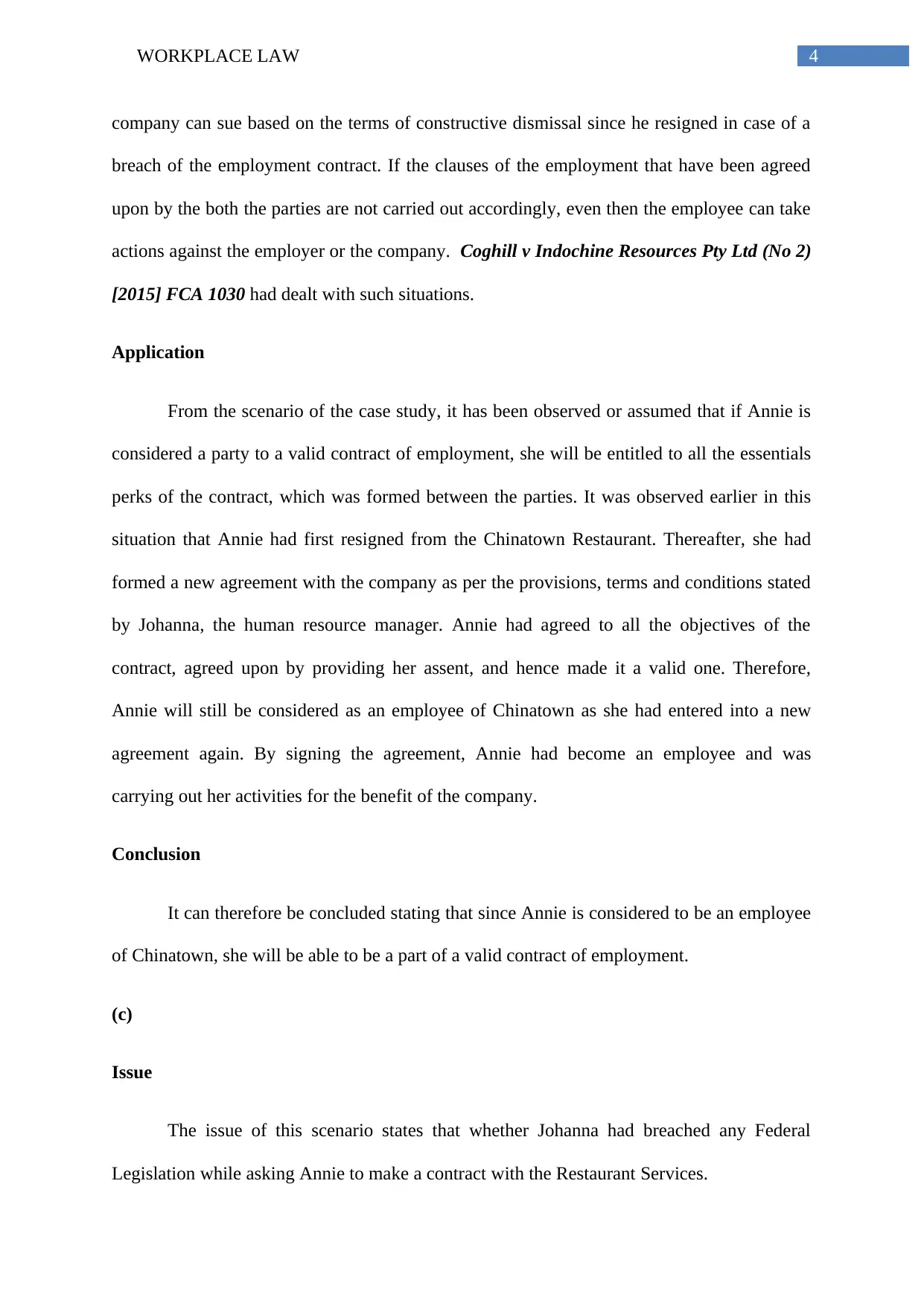
4WORKPLACE LAW
company can sue based on the terms of constructive dismissal since he resigned in case of a
breach of the employment contract. If the clauses of the employment that have been agreed
upon by the both the parties are not carried out accordingly, even then the employee can take
actions against the employer or the company. Coghill v Indochine Resources Pty Ltd (No 2)
[2015] FCA 1030 had dealt with such situations.
Application
From the scenario of the case study, it has been observed or assumed that if Annie is
considered a party to a valid contract of employment, she will be entitled to all the essentials
perks of the contract, which was formed between the parties. It was observed earlier in this
situation that Annie had first resigned from the Chinatown Restaurant. Thereafter, she had
formed a new agreement with the company as per the provisions, terms and conditions stated
by Johanna, the human resource manager. Annie had agreed to all the objectives of the
contract, agreed upon by providing her assent, and hence made it a valid one. Therefore,
Annie will still be considered as an employee of Chinatown as she had entered into a new
agreement again. By signing the agreement, Annie had become an employee and was
carrying out her activities for the benefit of the company.
Conclusion
It can therefore be concluded stating that since Annie is considered to be an employee
of Chinatown, she will be able to be a part of a valid contract of employment.
(c)
Issue
The issue of this scenario states that whether Johanna had breached any Federal
Legislation while asking Annie to make a contract with the Restaurant Services.
company can sue based on the terms of constructive dismissal since he resigned in case of a
breach of the employment contract. If the clauses of the employment that have been agreed
upon by the both the parties are not carried out accordingly, even then the employee can take
actions against the employer or the company. Coghill v Indochine Resources Pty Ltd (No 2)
[2015] FCA 1030 had dealt with such situations.
Application
From the scenario of the case study, it has been observed or assumed that if Annie is
considered a party to a valid contract of employment, she will be entitled to all the essentials
perks of the contract, which was formed between the parties. It was observed earlier in this
situation that Annie had first resigned from the Chinatown Restaurant. Thereafter, she had
formed a new agreement with the company as per the provisions, terms and conditions stated
by Johanna, the human resource manager. Annie had agreed to all the objectives of the
contract, agreed upon by providing her assent, and hence made it a valid one. Therefore,
Annie will still be considered as an employee of Chinatown as she had entered into a new
agreement again. By signing the agreement, Annie had become an employee and was
carrying out her activities for the benefit of the company.
Conclusion
It can therefore be concluded stating that since Annie is considered to be an employee
of Chinatown, she will be able to be a part of a valid contract of employment.
(c)
Issue
The issue of this scenario states that whether Johanna had breached any Federal
Legislation while asking Annie to make a contract with the Restaurant Services.
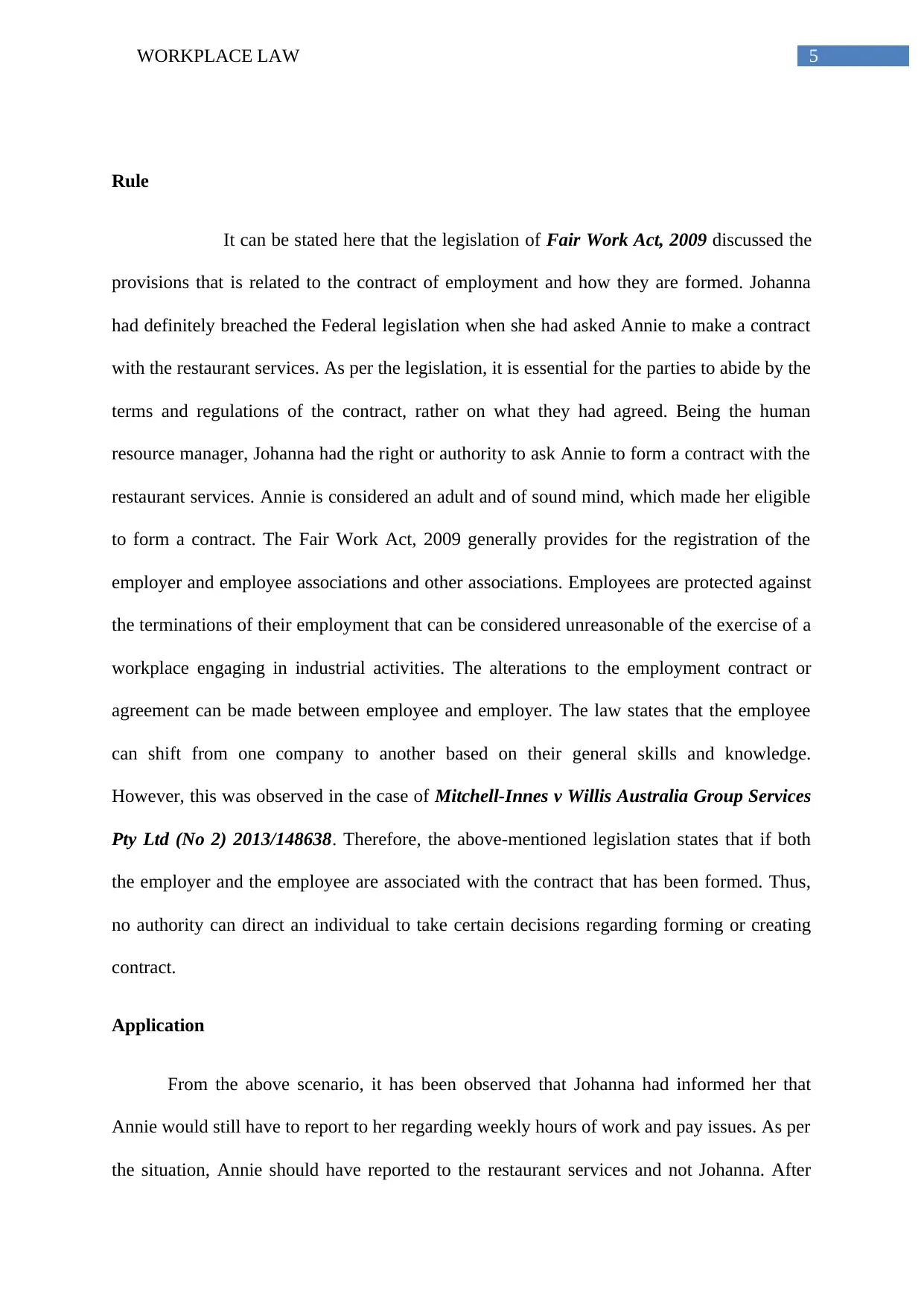
5WORKPLACE LAW
Rule
It can be stated here that the legislation of Fair Work Act, 2009 discussed the
provisions that is related to the contract of employment and how they are formed. Johanna
had definitely breached the Federal legislation when she had asked Annie to make a contract
with the restaurant services. As per the legislation, it is essential for the parties to abide by the
terms and regulations of the contract, rather on what they had agreed. Being the human
resource manager, Johanna had the right or authority to ask Annie to form a contract with the
restaurant services. Annie is considered an adult and of sound mind, which made her eligible
to form a contract. The Fair Work Act, 2009 generally provides for the registration of the
employer and employee associations and other associations. Employees are protected against
the terminations of their employment that can be considered unreasonable of the exercise of a
workplace engaging in industrial activities. The alterations to the employment contract or
agreement can be made between employee and employer. The law states that the employee
can shift from one company to another based on their general skills and knowledge.
However, this was observed in the case of Mitchell-Innes v Willis Australia Group Services
Pty Ltd (No 2) 2013/148638. Therefore, the above-mentioned legislation states that if both
the employer and the employee are associated with the contract that has been formed. Thus,
no authority can direct an individual to take certain decisions regarding forming or creating
contract.
Application
From the above scenario, it has been observed that Johanna had informed her that
Annie would still have to report to her regarding weekly hours of work and pay issues. As per
the situation, Annie should have reported to the restaurant services and not Johanna. After
Rule
It can be stated here that the legislation of Fair Work Act, 2009 discussed the
provisions that is related to the contract of employment and how they are formed. Johanna
had definitely breached the Federal legislation when she had asked Annie to make a contract
with the restaurant services. As per the legislation, it is essential for the parties to abide by the
terms and regulations of the contract, rather on what they had agreed. Being the human
resource manager, Johanna had the right or authority to ask Annie to form a contract with the
restaurant services. Annie is considered an adult and of sound mind, which made her eligible
to form a contract. The Fair Work Act, 2009 generally provides for the registration of the
employer and employee associations and other associations. Employees are protected against
the terminations of their employment that can be considered unreasonable of the exercise of a
workplace engaging in industrial activities. The alterations to the employment contract or
agreement can be made between employee and employer. The law states that the employee
can shift from one company to another based on their general skills and knowledge.
However, this was observed in the case of Mitchell-Innes v Willis Australia Group Services
Pty Ltd (No 2) 2013/148638. Therefore, the above-mentioned legislation states that if both
the employer and the employee are associated with the contract that has been formed. Thus,
no authority can direct an individual to take certain decisions regarding forming or creating
contract.
Application
From the above scenario, it has been observed that Johanna had informed her that
Annie would still have to report to her regarding weekly hours of work and pay issues. As per
the situation, Annie should have reported to the restaurant services and not Johanna. After
⊘ This is a preview!⊘
Do you want full access?
Subscribe today to unlock all pages.

Trusted by 1+ million students worldwide
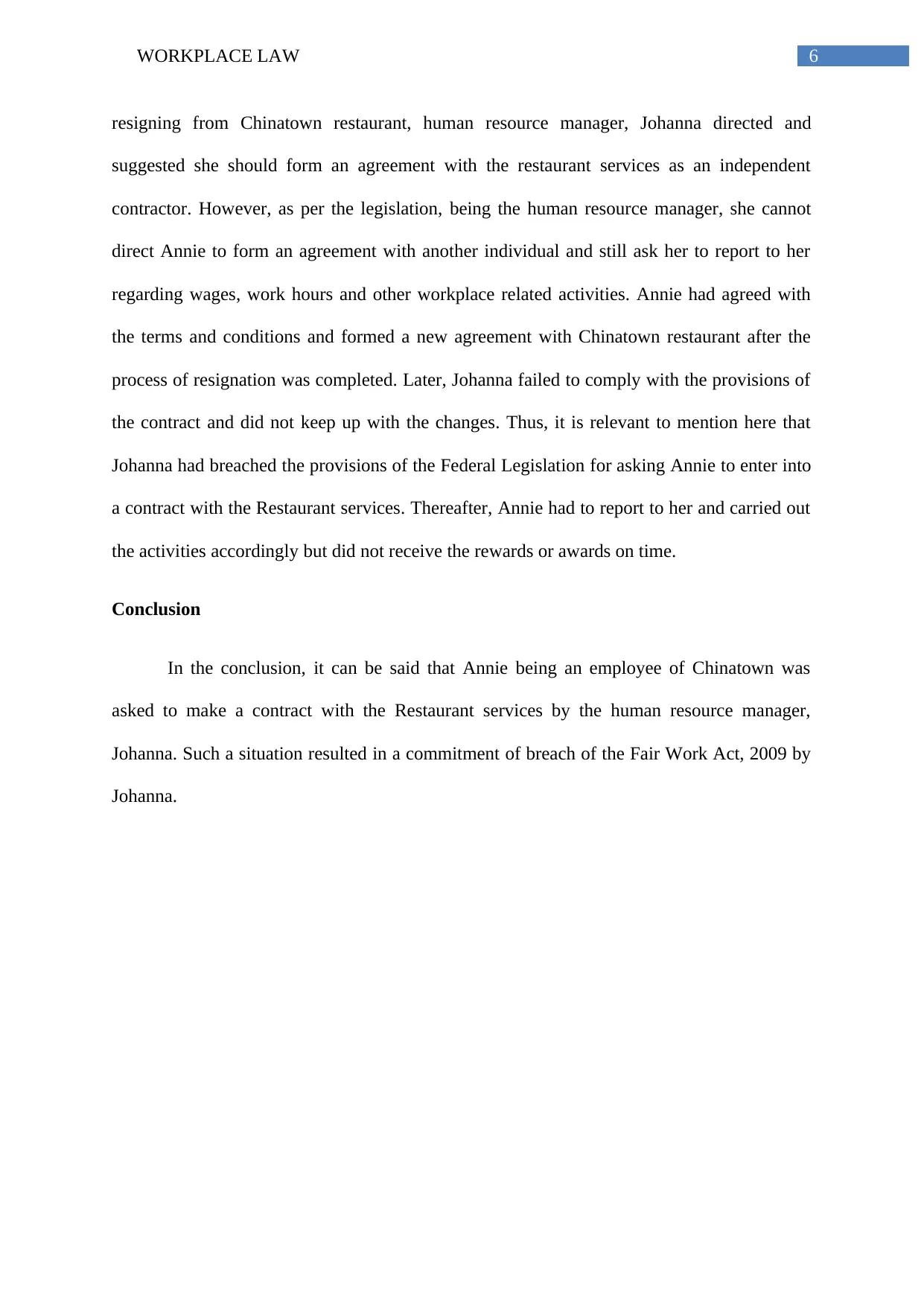
6WORKPLACE LAW
resigning from Chinatown restaurant, human resource manager, Johanna directed and
suggested she should form an agreement with the restaurant services as an independent
contractor. However, as per the legislation, being the human resource manager, she cannot
direct Annie to form an agreement with another individual and still ask her to report to her
regarding wages, work hours and other workplace related activities. Annie had agreed with
the terms and conditions and formed a new agreement with Chinatown restaurant after the
process of resignation was completed. Later, Johanna failed to comply with the provisions of
the contract and did not keep up with the changes. Thus, it is relevant to mention here that
Johanna had breached the provisions of the Federal Legislation for asking Annie to enter into
a contract with the Restaurant services. Thereafter, Annie had to report to her and carried out
the activities accordingly but did not receive the rewards or awards on time.
Conclusion
In the conclusion, it can be said that Annie being an employee of Chinatown was
asked to make a contract with the Restaurant services by the human resource manager,
Johanna. Such a situation resulted in a commitment of breach of the Fair Work Act, 2009 by
Johanna.
resigning from Chinatown restaurant, human resource manager, Johanna directed and
suggested she should form an agreement with the restaurant services as an independent
contractor. However, as per the legislation, being the human resource manager, she cannot
direct Annie to form an agreement with another individual and still ask her to report to her
regarding wages, work hours and other workplace related activities. Annie had agreed with
the terms and conditions and formed a new agreement with Chinatown restaurant after the
process of resignation was completed. Later, Johanna failed to comply with the provisions of
the contract and did not keep up with the changes. Thus, it is relevant to mention here that
Johanna had breached the provisions of the Federal Legislation for asking Annie to enter into
a contract with the Restaurant services. Thereafter, Annie had to report to her and carried out
the activities accordingly but did not receive the rewards or awards on time.
Conclusion
In the conclusion, it can be said that Annie being an employee of Chinatown was
asked to make a contract with the Restaurant services by the human resource manager,
Johanna. Such a situation resulted in a commitment of breach of the Fair Work Act, 2009 by
Johanna.
Paraphrase This Document
Need a fresh take? Get an instant paraphrase of this document with our AI Paraphraser
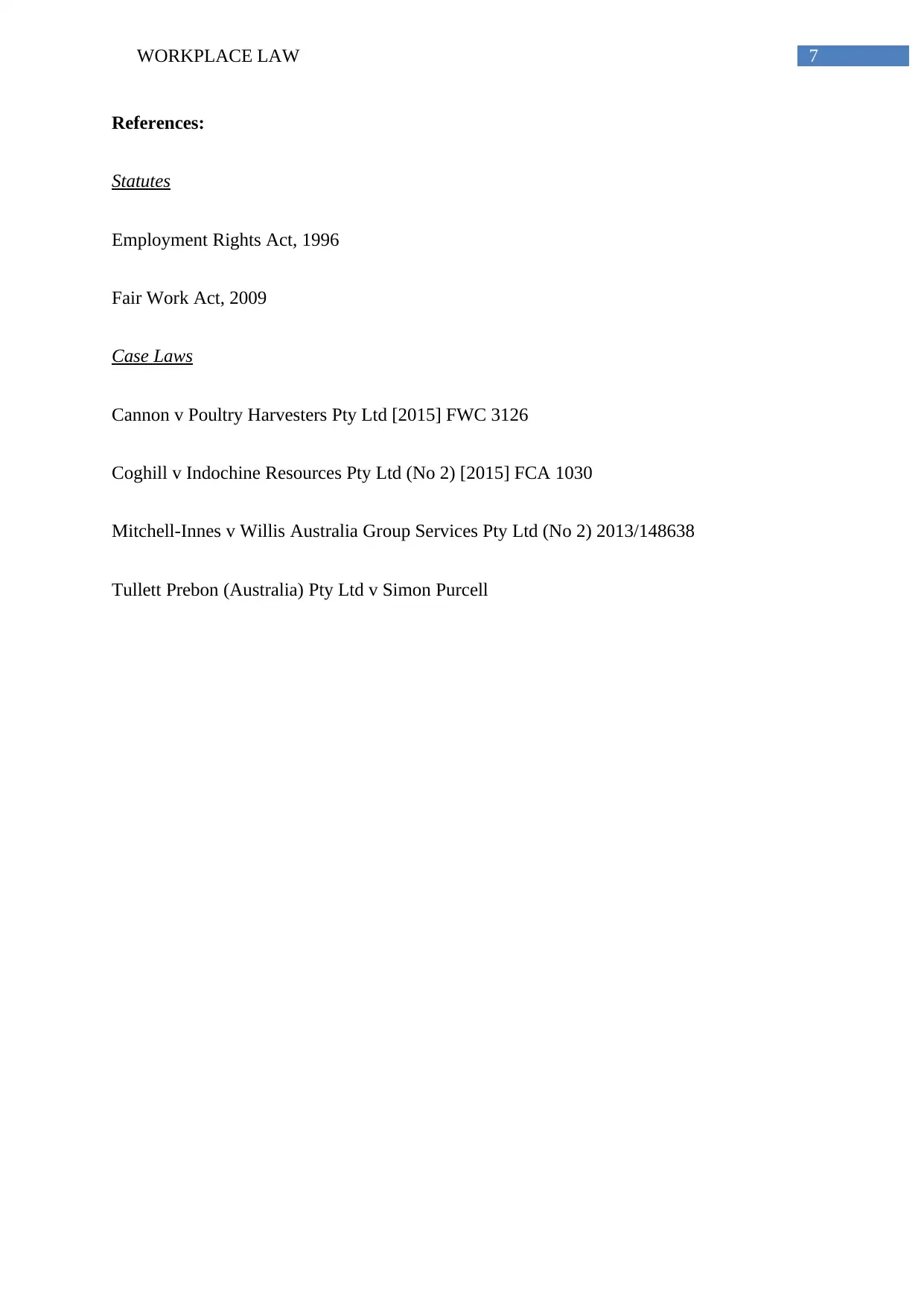
7WORKPLACE LAW
References:
Statutes
Employment Rights Act, 1996
Fair Work Act, 2009
Case Laws
Cannon v Poultry Harvesters Pty Ltd [2015] FWC 3126
Coghill v Indochine Resources Pty Ltd (No 2) [2015] FCA 1030
Mitchell-Innes v Willis Australia Group Services Pty Ltd (No 2) 2013/148638
Tullett Prebon (Australia) Pty Ltd v Simon Purcell
References:
Statutes
Employment Rights Act, 1996
Fair Work Act, 2009
Case Laws
Cannon v Poultry Harvesters Pty Ltd [2015] FWC 3126
Coghill v Indochine Resources Pty Ltd (No 2) [2015] FCA 1030
Mitchell-Innes v Willis Australia Group Services Pty Ltd (No 2) 2013/148638
Tullett Prebon (Australia) Pty Ltd v Simon Purcell
1 out of 8
Related Documents
Your All-in-One AI-Powered Toolkit for Academic Success.
+13062052269
info@desklib.com
Available 24*7 on WhatsApp / Email
![[object Object]](/_next/static/media/star-bottom.7253800d.svg)
Unlock your academic potential
Copyright © 2020–2026 A2Z Services. All Rights Reserved. Developed and managed by ZUCOL.





